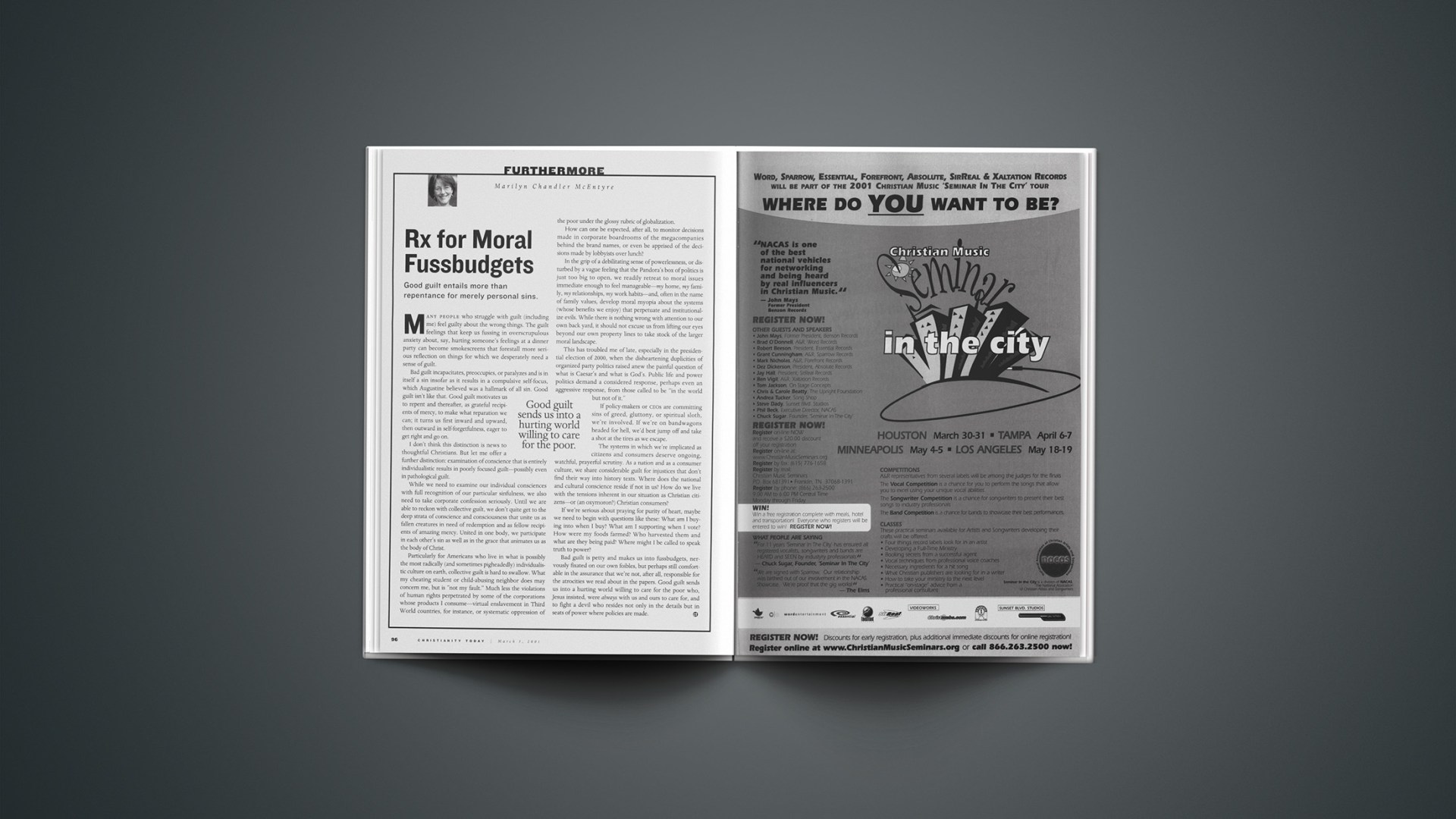Bad guilt incapacitates, preoccupies, or paralyzes and is in itself a sin insofar as it results in a compulsive self-focus, which Augustine believed was a hallmark of all sin. Good guilt isn’t like that. Good guilt motivates us to repent and thereafter, as grateful recipients of mercy, to make what reparation we can; it turns us first inward and upward, then outward in self-forgetfulness, eager to get right and go on.
I don’t think this distinction is news to thoughtful Christians. But let me offer a further distinction: examination of conscience that is entirely individualistic results in poorly focused guilt—possibly even in pathological guilt.
While we need to examine our individual consciences with full recognition of our particular sinfulness, we also need to take corporate confession seriously. Until we are able to reckon with collective guilt, we don’t quite get to the deep strata of conscience and consciousness that unite us as fallen creatures in need of redemption and as fellow recipients of amazing mercy. United in one body, we participate in each other’s sin as well as in the grace that animates us as the body of Christ.
Particularly for Americans who live in what is possibly the most radically (and sometimes pigheadedly) individualistic culture on earth, collective guilt is hard to swallow. What my cheating student or child-abusing neighbor does may concern me, but is “not my fault.” Much less the violations of human rights perpetrated by some of the corporations whose products I consume—virtual enslavement in Third World countries, for instance, or systematic oppression of the poor under the glossy rubric of globalization.
How can one be expected, after all, to monitor decisions made in corporate boardrooms of the megacompanies behind the brand names, or even be apprised of the decisions made by lobbyists over lunch?
In the grip of a debilitating sense of powerlessness, or disturbed by a vague feeling that the Pandora’s box of politics is just too big to open, we readily retreat to moral issues immediate enough to feel manageable—my home, my family, my relationships, my work habits—and, often in the name of family values, develop moral myopia about the systems (whose benefits we enjoy) that perpetuate and institutionalize evils. While there is nothing wrong with attention to our own back yard, it should not excuse us from lifting our eyes beyond our own property lines to take stock of the larger moral landscape.
This has troubled me of late, especially in the presidential election of 2000, when the disheartening duplicities of organized party politics raised anew the painful question of what is Caesar’s and what is God’s. Public life and power politics demand a considered response, perhaps even an aggressive response, from those called to be “in the world but not of it.”
If policy-makers or CEOs are committing sins of greed, gluttony, or spiritual sloth, we’re involved. If we’re on bandwagons headed for hell, we’d best jump off and take a shot at the tires as we escape.
The systems in which we’re implicated as citizens and consumers deserve ongoing, watchful, prayerful scrutiny. As a nation and as a consumer culture, we share considerable guilt for injustices that don’t find their way into history texts. Where does the national and cultural conscience reside if not in us? How do we live with the tensions inherent in our situation as Christian citizens—or (an oxymoron?) Christian consumers?
If we’re serious about praying for purity of heart, maybe we need to begin with questions like these: What am I buying into when I buy? What am I supporting when I vote? How were my foods farmed? Who harvested them and what are they being paid? Where might I be called to speak truth to power?
Bad guilt is petty and makes us into fussbudgets, nervously fixated on our own foibles, but perhaps still comfortable in the assurance that we’re not, after all, responsible for the atrocities we read about in the papers. Good guilt sends us into a hurting world willing to care for the poor who, Jesus insisted, were always with us and ours to care for, and to fight a devil who resides not only in the details but in seats of power where policies are made.
Copyright © 2001 Christianity Today. Click for reprint information.
Related Elsewhere
McEntyre’s credentials are available at the Westmont College site, including a list of all her books and articles.In Quiet Light: Poems on Vermeer’s Women, McEntyre’s latest book, is available from Amazon.com.
Previous McEntyre columns for Christianity Today include:
Community, Not Commodity (Jan. 16, 2001)
Nice Is Not the Point (Nov. 29, 2000)
The Fullness of Time (Oct. 12, 2000)
‘I’ve Been Through Things’ (Sept. 6, 2000)
Silence Is to Dwell In (Aug. 10, 2000)










